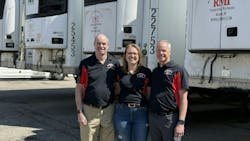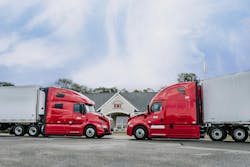Evolving operation: Kordish leads RMI into new era
Ralph Moyle, Inc. (RMI) CEO Ashley Kordish grew up on a small farm in Mattawan, Michigan, where her grandfather, RMI’s namesake founder, started their refrigerated trucking business. Her earliest, and most fond, memories involve playing in the backyard of the family farmhouse, and watching heavy-duty trucks pull in and out of the fuel island behind the fence.
So, diesel is in her blood. But she wasn’t always sure trucking is in her heart.
The Moyles also are a family of teachers, so she considered going that direction in high school. Then she served as a volunteer firefighter and EMT at the Mattawan Fire Department while also working part-time at RMI and attending college. And after securing a bachelor's degree in integrated supply management at Western Michigan University, she spent nearly three years at American Axle and Manufacturing in quality control and material planning.
That’s when a passion for transportation finally filled her soul.
“That was a pivotal time for me,” she recalled. “I was trying to figure out if the family business was truly where I wanted to be. And I can definitively say my time away solidified that I belong here.”
Kordish returned in 2015 as an operations manager, where she honed her trucking expertise, then worked her way up to vice president of operations in 2018, and CEO in 2022. Now, 10 years into her tenure, she’s fully invested in overhauling RMI’s approach to operations and fleet management, navigating a challenging environment, and preserving the company’s culture.
“Seeing her grow, and really jump into that leadership role full-time, has been fantastic,” said Clarice Talaga, associate director of operations.
“She’s definitely risen to the occasion.”
A woman in transportation
Kordish’s RMI sabbatical did more than provide career clarity. It also shaped her management perspective, made her tougher, and set a precedent for family members coming up behind her. Younger sister Olivia Moyle worked at J.B. Hunt before joining RMI as a transportation account manager. “I had to become more assertive while working at American Axle, and that was a good thing for me because I was a little shy when I started,” Kordish said.
Her father, CSO Michael Moyle, and uncle, CFO Jonathon Moyle—Ralph’s sons who still share ownership of the company—didn’t hand her anything either. She swept out trailers as a teenager, drove a forklift in RMI’s warehouse when she was older, and spent time in dispatching, billing, and the shop. “That was critical,” Kordish said. “It helped me gain credibility and respect, especially as a female in this industry—and the first female leader in our organization.”
Steve Bolf, fleet and facilities manager—and a 22-year RMI veteran—agrees.
“I’ve always thought taking the time to work in every part of the company, and learn what they do, was a very noble thing,” he said.
Kordish always felt like she had to work harder to prove herself in a traditionally male-dominated industry. Now one of the Women in Trucking Association’s Top Women to Watch in Transportation for 2023, she’s working hard to further their feminine cause, and help other women realize their trucking dreams. “I’m extremely proud to be a woman in trucking,” she said. “We’re active members in the Women in Trucking Association, and I go to all the conferences.
“Representing women in this industry is something I think about a lot.”
Maintaining RMI’s small-town values, and keeping the business in the family, are equally important to Kordish. Bolf says she’s excelling there, too. The job has changed significantly since Ralph and his sons ran the show, but the company’s emphasis on personalized customer service and open-door employee communication remains RMI’s greatest differentiator. “She’s really helped promote a culture and space where everyone has an opportunity,” Talaga agreed.
“Can you do the work? At the end of the day, nothing else matters.”
Evolving reefer operation
RMI’s roots date to 1945, when then 13-year-old Ralph began hauling grapes from local farms for Welch’s. He purchased his first tractor in 1952 and incorporated Ralph Moyle, Inc. in 1966. Michael, who took the lead growing RMI’s warehousing operation, and Jonathon joined their father in the early 1990s, and Ralph started stepping back from the business in the early 2000s, although he continued to visit their Mattawan terminal long after he retired.
RMI’s founder died Jan. 11, 2022—but not before learning of Kordish’s intention to join, and one day lead, his company.
“I’m grateful he knew that before he passed away,” Kordish said.
Today, RMI hauls juice, beer, and tea with 60 trucks, 90 reefer trailers, and 186 dry van trailers, and corn syrup in six tank trailers; and also maintains a 400,000-sq.-ft. ambient-temperature warehouse in nearby Paw Paw. The company delivered almost 17,000 loads to customers across 38 states in 2024, despite dealing with a rate-suppressing freight recession. “Last year was the roughest year I’ve seen in my career, and even my uncle said it was one of the worst years in his career,” Kordish said. “So we just buckled down and worked toward surviving.
“Our warehouse operation really is what kept us moving.”
Diversification is the key to managing trucking’s ups and downs, Talaga added. So are consistent, close-knit relationships, and nearly 90% of RMI’s transport business involves contracted hauls and dedicated services. Those partnerships also help RMI avoid heading home empty, with only a 14% weekly deadhead rate, Kordish shared. Still, leaders are doing their best to adjust to the evolving landscape, this year cutting 10 trucks and tightening RMI’s Midwest footprint.
“We’re trying to keep those drivers who increasingly want more home time,” Kordish said. “But the Midwest region also seems to be our sweet spot as a company. That’s where we’re landing nice lanes.”
RMI also leans on associations like WIT and the Truckload Carriers Association to stay informed on industry issues and learn new ways to operate more efficiently. The company participates in the TCA Profitability Program (TPP) and Kordish is in line to chair TCA’s Refrigerated Division. “TCA has been incredible,” Kordish said. “I love that organization. It’s great for small family-owned carriers like us who want to connect with like-minded companies.”
Driver-centric culture
The most important individuals in any trucking enterprise are the drivers. That’s why Kordish also obtained her commercial driver’s license. “I really want to understand our drivers, and what they’re going through, so I can help make conditions better for them,” she explained.
RMI employs 40 regional and short-haul drivers, nine local drivers, and nine drivers dedicated to shuttling and spotting equipment for key customers like Coca-Cola—one of Ralph’s original accounts—Knouse Foods, and Gordon Food Service. And RMI drivers tend to stick around. The company boasts a 12.5% year-to-date turnover rate thanks to its approach to caring for drivers. “They appreciate the culture here more than anything else,” Talaga said.
In addition to constant communication, first-name relationships, and responsive maintenance services, RMI pays its company drivers by percentage of load to incentivize selection of longer, higher-paying runs. “It creates more autonomy for our drivers in terms of load selection,” Talaga said. “Also, when we’re negotiating contracts with customers, and rates go up, they get a raise, too, because their percentage increases.”
Word of mouth still is the best recruiting tool. But RMI also is connected to The Michigan Works! Association and administers its own apprenticeship program that helps young drivers obtain their CDL. RMI prefers candidates over the age of 21 but will take on prospects as young as 18. The two-phase training includes CDL prep and 4-6 weeks of on-road instruction. Two drivers who recently completed the program jumped right into critical roles. “All the things I’m typically worried about with new hires, they have under control,” Talaga said.
“It’s nice having a reliable driver pipeline.”
RMI utilizes Smith System training and recently implemented Trakstar’s learning management system to make ongoing education easier for drivers on the go. And to promote continuous improvement, the carrier leans on Netradyne’s forward-, inward-, and side-facing cameras and GreenZone scoring system, which generates excitement for performance improvement. “Our drivers’ abilities, and their safe-driving skills, have really increased since we started using it,” Talaga said. “And we catch crazy things on these cameras.
“I’ll have a driver I know and trust call with an outlandish story, and I’m thinking, surely they’re pulling my leg. And they’re like, ‘No, check the camera. That’s what happened.’ And sure enough, it is.”
Updated equipment strategy
Today’s drivers also gravitate toward newer, well-maintained equipment, so RMI is adjusting its equipment strategy, too. “Ralph used to buy anything that ran in an auction,” Kordish said. “People used to call us the rainbow fleet because we ran trucks of all different types and colors.
“So, about 10 years ago, we started buying new trucks and trailers.”
RMI’s fleet now primarily consists of Volvo trucks sourced from M&K Truck Centers in Kalamazoo, Michigan, and Freightliners from Freightliner of Kalamazoo, which is across the street from its Mattawan terminal. Most trucks are sleepers, but RMI also runs a mix of leased and purchased tractors to protect them from any recall issues and provide more fleet flexibility.
The carrier rotated in 15 newly leased Freightliner Cascadias last year.
“Freightliner offers the ParkSmart bunk system, which acts as a factory-installed APU [auxiliary power unit],” Bolf said. “Not having to idle trucks to keep drivers cool on breaks is a huge plus.”
New dry van and reefer trailers are Hyundai Transleads from Trailer Equipment in Grand Rapids. For the first time in RMI history, the company last year added nine brand-new Hyundai refrigerated trailers with new Carrier Transicold X4 7500 transport refrigeration units (TRUs). “We’ve stuck with Carrier because when the emissions regulations started to hit, they did the smart thing and detuned their horsepower below 25 so they didn’t need a diesel oxidation catalyst, EGR [exhaust gas recirculation], and all the engine electronics,” Bolf said.
RMI’s terminal includes a 20,000-sq.-ft., eight-bay shop for truck and TRU maintenance, and a 6,400-sq.-ft. shop with three drive-through bays for heavy-duty trailer work, like frame and ducted floor repairs. RMI is certified to perform in-house warranty service on its Freightliner and Volvo tractors, and it employs a full-time reefer technician to boost TRU uptime.
New Freightliners feature full Detroit powertrains and Assurance safety systems, and Samsara electronic logging devices. New trailers feature Hendrickson suspensions and TireMaax tire pressure control systems, Orbcomm GPS tracking and load sensors, and Carrier Lynx Fleet telematics.
“We run equipment from the vendors who treat us best,” Bolf summarized.
Family-focused future
RMI is not planning to buy any new trucks and trailers this year due to the uncertainty surrounding tariffs, and the Trump administration’s plans to roll back engine emissions regulations. Instead, it’s focusing on extending trade cycles while refining processes and procedures, expanding warehouse services, and gearing up for what they hope is an improving market.
“We’re seeing signs of hope,” Kordish said.
“Brokers are reaching out to us, calling and emailing about available loads, which tells me capacity is opening up.”
In another positive signal, more experienced drivers are approaching RMI about work, Talaga said, and their Midwest lanes are rebounding faster than other lanes, so the carrier is well-positioned to take advantage of an uptick in business. But Kordish says they’ll continue to proceed cautiously. “Oftentimes, trucking companies will buckle down in a freight recession and then, when things are good, they forget to keep monitoring their expenses.
“We’ve decided we’re not doing that. We’re going to stay buckled down.”
RMI also is committed to furthering its family feel, while Kordish prepares the next generation of leadership in trucking—her two children, 7-year-old Valeria and 5-year-old Xander. “One day, I would love for them to enter the family business,” she said. “They already know the difference between a dry van and reefer, and they love hanging around trucks and coming to the office. But I’m going to take the same approach my family took with me.
“I want them to decide where they belong.”
About the Author

Jason McDaniel
Jason McDaniel, based in the Houston TX area, has nearly 20 years of experience as a journalist. He spent 15 writing and editing for daily newspapers, including the Houston Chronicle, and began covering the commercial vehicle industry in 2018. He was named editor of Bulk Transporter and Refrigerated Transporter magazines in July 2020.



